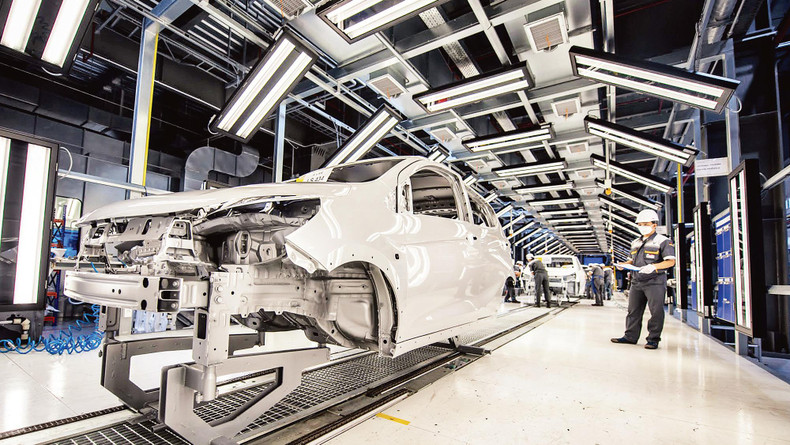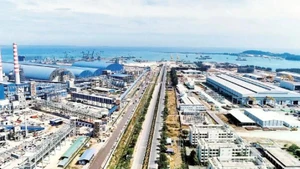In the current economic structure, the state sector contributes 28% of GDP, while the contributions from foreign firms and private domestic enterprises are 18% and 54% respectively.
The imprint of private enterprises
After more than 35 years of economic reform, Vietnam’s private sector has truly grown in size, creating many jobs, making significant contributions to the economy and taking part in many sectors that require intelligence and advanced technology, not only at home but also abroad.
The imprint of private enterprises is strongly reflected in the country’s socio-economic development. In agriculture, private enterprises make a primary contribution to the export revenue of over 40 billion USD. The property sector is dominated by private companies, which also take the lead in tourism and services, with resorts and attractions named among the world’s best, in recent years. The business scope of private enterprises are also gradually expanded to all fields, from steel manufacturing to road and airport construction, and most recently, energy generation and transmission.
Those are the areas that were previously only performed by state-owned enterprises. Now, the participation of private enterprises has promoted strong competitiveness, in both the cost and quality of construction investment.
Private enterprises also have access to remote and disadvantaged areas, to provide and explore potential services, such as community tourism, and local agricultural product processing, thereby supporting the livelihood of the people.
It can be said that, although it is still scattered, the size and capacity of the private economy are present everywhere, in all areas of the economy. It is clear that when reviewing the important fields and the top industries that give the current economic appearance, almost all private enterprises play an increasingly larger and clearer role.
 |
| The automobile production line at Vinfast automobile factory at Dinh Vu industrial park, Hai Phong city. (Photo: Viet Chung) |
Within the manufacturing and processing industry, there is Vingroup, Truong Hai automobile manufacturer, TH milk producer, Masan food and beverage producers, and the budget carrier Vietjet Air. In the financial and banking sector, big names such as Techcombank, HD Bank, and VPBank compete directly with the four largest state-owned banks in Vietnam (Big 4). Even in the field of digital transformation and Industry 4.0, dynamic private enterprises are the pioneering forces that rise to the top, such as FPT and CMC, thanks to their ability to export software.
It is forecasted that there will continue to be more imprints and new achievements of private enterprises, in parallel with the development of the country when large enterprises, such as Vingroup, Sungroup, and Deo Ca directly participate in the investment of national highway projects.
Enhancing business environment reform
Vietnamese businesses and entrepreneurs have made remarkable progress, and some of them have established their position with growing brand development in the international market. Many Vietnamese entrepreneurs and businesses have promoted national pride and showed aspiration to affirm national values and virtue in the international integration process.
However, the transformation of Vietnamese enterprises from micro-scale to medium-sized still takes too long, and many of them don’t grow or in some cases, do not want to grow. Although Vietnamese entrepreneurs hold a strong entrepreneurial spirit, they have not yet been provided with the proper conditions to nurture and promote their ideas to develop them in the market, thus it is difficult for start-ups to become unicorns. More worryingly, the reform of the business environment has stalled since the outbreak of the pandemic, which has slowed down the reform process and weakened the efforts to restore lost interest in some ministries and sectors.
From being unrecognised, the private sector is now identified as an important driving force of the economy. The sector has grown strongly and has made many important contributions to the country. The private economy makes up an increasing proportion and plays a more important role in the country's economic development.
Local governments seem to be less motivated in the reform of administrative procedures and improvement of the business environment. Some localities even set the principle that they only promulgate regulations once the legal safety reaches 99.9%. State agencies also rigidly obey every word in the provisions of the law, instead of following the content and spirit of the law, in handling administrative procedures or promoting flexibility, when solving difficulties and problems facing people and businesses.
From the fear of being wrong, civil servants also created more difficulties than advantages, while dealing with administrative procedures for people and businesses. In this way, they feel more secure, especially in handling procedures in the field of land and construction.
In fact, despite facing many difficulties, the economy still has great growth potential if the business environment is improved drastically and persistently. The next generation of Vietnamese businesses will appear during this special period. However, to form a generation of enterprises that can serve society, it is necessary to continue promoting reform, and the constructive role of the Government is indispensable. The conditions for building an independent, self-reliant and sustainable economy must be based on awakening the full potential, initiative and creativity of enterprises. It is crucial to consider enterprises as the focus of policy, and the private economy as the main driving force of the economy. The Party and State have affirmed and demonstrated this through strong commitments, resolutions, and policies. The remaining problem is to improve the enforcement capacity of the whole apparatus and to spread the reform spirit to each cadre and civil servant at both the central and local levels.
















